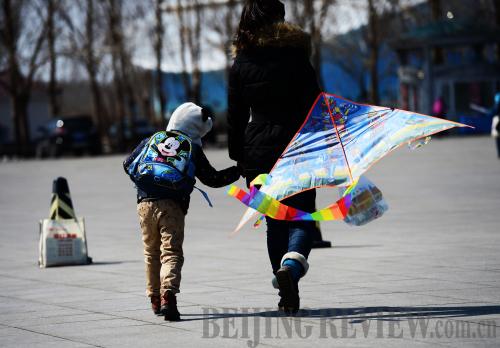|
 |
|
CHEER UP KIDS: A mom and her autistic son take part in a kite-flying activity in Harbin, Heilongjiang Province, to mark World Autism Awareness Day on April 2 (WANG KAI) |
Drought Response
A drought that has lingered since October 2012 has affected 23.7 million people living in Yunnan, Gansu and Sichuan provinces to date, causing economic losses of more than 6.8 billion yuan ($1.1 billion), according to civil affairs authorities.
The National Disaster Reduction Commission and the Ministry of Civil Affairs have activated an emergency response plan and sent work teams to aid in disaster relief.
Authorities said that the drought may last, as heavy rain is not expected in April.
Antarctic Research
China is planning to build two new research stations in Antarctica by 2015 and site inspections are already being conducted by an expedition team, the State Oceanic Administration (SOA) said on March 28.
A summer station that can be used from December to March will be set up between existing Zhongshan and Kunlun stations to provide replenishment and other logistical support, the SOA said.
The station will be used to study geology, glaciers, geomagnetism and atmospheric science in Antarctica.
A perennial station will also be built in Victoria Land by 2015. The station will allow researchers to carry out multi-disciplinary research on bio-ecology and satellite remote sensing.
China's three existing Antarctic research stations are the Great Wall, Zhongshan and Kunlun stations.
HIV-Infected Students
The number of Chinese students registered as infected with HIV is on the rise, an official said on March 30.
A total of 1,700 students were reported HIV positive in 2012, a 24.5-percent increase from 2011, said Yu Jingjin with the National Health and Family Planning Commission.
Yu said that 87 percent of the total HIV/AIDS cases in 2012 came via sexual transmission.
In total, China has reported more than 7,000 students living with HIV. The first AIDS patient in China was found in 1985.
Smog Fight
Beijing will tighten restrictions on car use to reduce air pollution, local authorities said.
"We are considering launching the policy in particular areas and periods to control the number of cars on roads, as well as managing the use of cars from other cities," said Fang Li, Deputy Director of Beijing's Environmental Protection Bureau.
With a population of about 20 million, Beijing had more than 5 million vehicles at the end of 2012.
But authorities have been encouraging people to use public transportation.
The capital city will also continue to control vehicle emissions using the policy that restricts private cars from being driven one day of the week. | 